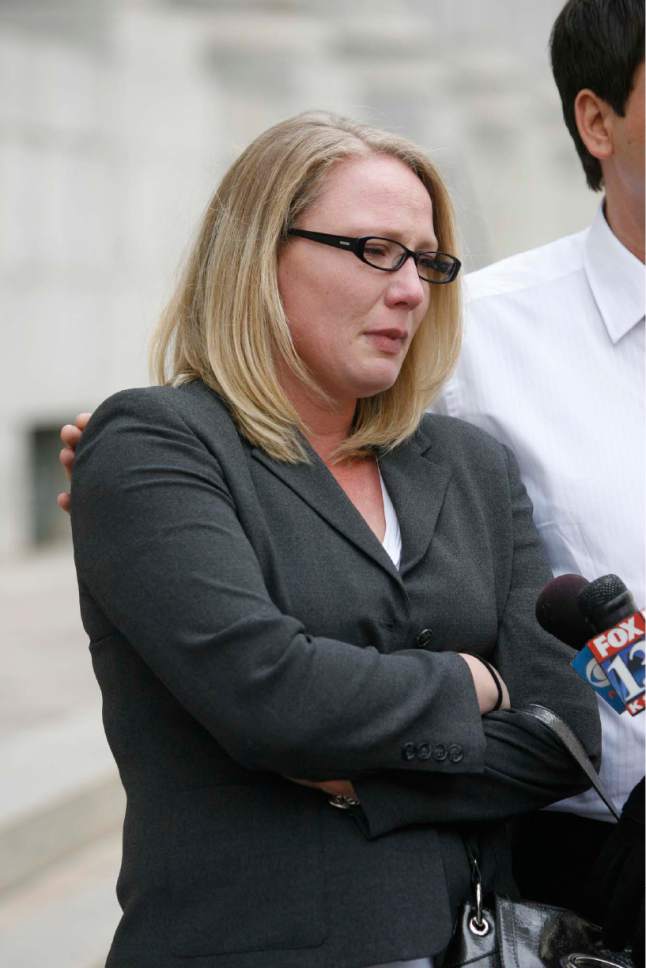This is an archived article that was published on sltrib.com in 2015, and information in the article may be outdated. It is provided only for personal research purposes and may not be reprinted.
Even in the pitch-black darkness of the night, the evidence of Sam Ives' abduction could be seen strewn along the mountain path.
A sleeping bag. Then socks. His pants.
"It was pitch dark and in the middle of the night and we had no flashlight," his mother, Rebecca Ives said Tuesday of events that occurred more than seven years ago. "But we just started running up the hill, because we could see the trail of his things."
Ives said she and her husband, Tim Mulvey, thought they were chasing after a person, who had taken the boy. Later, they would learn a black bear had sliced through a corner of the family's three-room tent and dragged their son and stepson up the mountain.
On Tuesday, Ives and her family announced a settlement had been reached in the wrongful death lawsuit they had filed against the state of Utah.
Authorities found the 11-year-old from Pleasant Grove dead a few hundreds yards from the campsite, his body mauled by the animal, which was trapped and killed the next day.
In the moments before the June 17, 2007 attack near the Timpooneke Campground, Ives said she was lying only about a foot away from where Sam slept, listening to him mumbling, "Leave me alone," in his sleep, his mother said.
Ives said she heard the sound of footfall outside the tent and then, Sam's muffled cry.
"We heard him yell, 'Help!' " she said. "That's what got us out of bed. We ripped the door open and saw the hole in the side of the tent. We looked and saw his entire sleeping bag was gone. We never saw the bear."
After a short and futile search in their bare feet, Mulvey went for help from a campground host, who called authorities. Ives said she sat stoking the campfire and clutching her younger son.
"I was trying to make the fire as big as I could so I could see and I was just screaming for him and crying," she said. "That was probably one of the worst moments of my life."
Not long after authorities arrived, Ives said a wildlife officer looked her in the eye and said with surety: "It was a bear."
Ives didn't believe the officer at first, insisting he inspect the tent, which was cut open with the sort of precision that she and Mulvey believed must have come from a knife.
"I was stunned. It took my breath away," she said. "He knew. He knew the second he got that phone call that it was that bear."
It would be weeks before Ives would hear that authorities had been looking for the bear because it had attacked another campsite about 12 hours before her family had arrived for their Father's Day weekend getaway. Had a camp host warned them, Ives, said, she would have turned the family car around and headed for home.
"There's no way that I would have put my child or my family in that situation," she said. "That's where, as a mother, I was unable to protect him."
The family sued wildlife agencies in both state and federal court and won monetary damages, but failed to get the thing they wanted most: policy or procedural changes that would require notifying the public or shuttering campsites when a dangerous bear is identified. Such policies, Ives said, would have saved Sam's life and kept her family intact.
"They will say that this is first human was killed by a bear in the state of Utah, but this is not the first human that has had a problem with a bear attacking them," Ives said. "I'm going to continue to bring this issue to the public. If Sam had survived that attack, he would do everything he could to tell people about this. Nothing has been fixed. Nothing has been put in place to prevent this from a happening again."
A native Utahn who began camping as a child, Ives said had always loved American Fork Canyon and that it used to be the place her family would go for a quick getaway from daily life.
"I can't go up that canyon anymore," she said. "I haven't been up there since he died."



